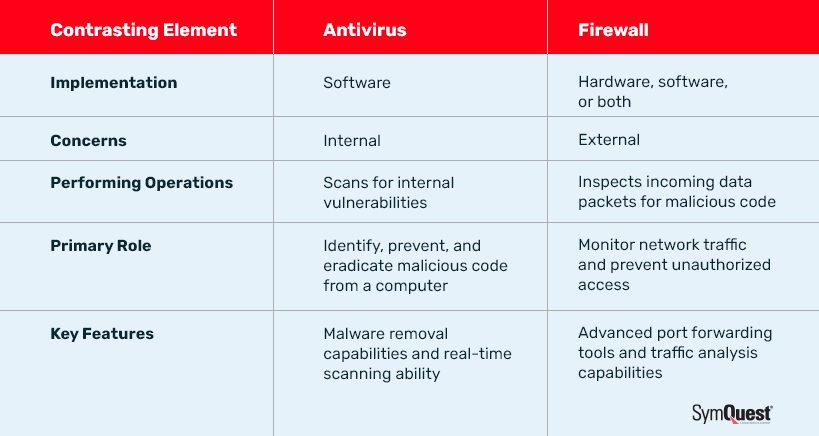Do you need a firewall if you have an antivirus?
Summary
Firewalls and antiviruses are both designed to protect an organization’s systems against cyber threats. However, they have a few key differences. Firewalls are mainly deployed at the network level while antivirus is primarily an endpoint security solution.
A firewall is a necessary safeguard for any online network. While every computer comes with some basic firewall protections, there are still vulnerabilities that can be exploited without an advanced firewall shield.
Antivirus software helps to protect the file system against unwanted programs, while a firewall helps to keep attackers or external threats from getting access to your system in the first place.
Yes, Windows Defender is a good basic virus protection software.
Yes, you can disable Windows Firewall if you have antivirus. However, it is recommended to have only one software firewall enabled and running to avoid conflicts and ensure proper functionality.
Without a firewall, you could leave yourself open to accepting every connection into your home network, making your devices and personal information exposed and vulnerable to malicious purposes.
Not having a firewall makes the network and connected devices vulnerable to cyber attacks, hacking, viruses, malware, unauthorized access, data theft, and network disruption. This can result in damage to the system, loss of confidential information, and a decrease in productivity.
A firewall cannot double up as an antivirus product. It is a protective barrier that prevents unauthorized access to your device but does not neutralize existing malware.
No, to ensure full coverage and protection, it is recommended to use the Windows Defender Firewall together with an advanced firewall in security software like McAfee.
Windows Defender is a good basic virus protection software, but for more comprehensive security, a third-party antivirus or anti-malware software may be needed.
Disabling the Windows Firewall should only be done temporarily to allow specific downloads or hardware installation. It is important to re-enable the firewall for ongoing protection.
Questions and Answers
1. Does antivirus provide a firewall?
Firewalls and antiviruses serve different purposes. Antivirus software focuses on protecting the file system against unwanted programs, while a firewall helps prevent unauthorized access to your system.
2. Is it really necessary to have a firewall?
Yes, a firewall is a necessary safeguard for any online network to prevent unauthorized access and protect against cyber threats.
3. Which is more important, firewall or antivirus?
Both firewall and antivirus are important for comprehensive security. Antivirus protects against known threats, while a firewall helps prevent unauthorized access to your system.
4. Is Windows antivirus and firewall enough?
Windows Defender provides basic virus protection, but it is recommended to have an additional firewall for enhanced security.
5. Can I disable Windows Firewall if I have antivirus?
Yes, you can disable Windows Firewall if you have another software firewall enabled. However, it is recommended to have only one firewall running to avoid conflicts.
6. What happens if you don’t use a firewall?
Not having a firewall leaves your network and devices vulnerable to unauthorized access, cyber attacks, data theft, and network disruptions.
7. What are the cons of not having a firewall?
Without a firewall, your network and connected devices are susceptible to hacking, viruses, malware, unauthorized access, data theft, and decrease in productivity.
8. Can a firewall double up as an antivirus product?
No, a firewall is not designed to neutralize existing malware on your device. It focuses on preventing unauthorized access.
9. Do I need both Windows Firewall and McAfee firewall?
For full coverage and protection, it is recommended to use the Windows Defender Firewall together with an advanced firewall in security software like McAfee.
10. Is Windows Firewall and antivirus enough?
While Windows Defender provides basic virus protection, a third-party antivirus or anti-malware software may be needed for more comprehensive security.
11. When should you disable Windows Firewall?
Disabling the Windows Firewall should only be done temporarily to allow specific downloads or hardware installation. It is important to re-enable the firewall for ongoing protection.

Does antivirus provide a firewall
Firewalls and antiviruses are both designed to protect an organization's systems against cyber threats. However, they have a few key differences, including: Deployment: Firewalls are mainly deployed at the network level while antivirus is primarily an endpoint security solution.
Cached
Is it really necessary to have a firewall
A firewall is a necessary safeguard for any online network. But while every computer comes with some basic firewall protections, there are still vulnerabilities that can be exploited without an advanced firewall shield.
Cached
Which is more important firewall or antivirus
Why are antivirus software and firewalls needed While antivirus software helps to protect the file system against unwanted programs, a firewall helps to keep attackers or external threats from getting access to your system in the first place.
Is Windows antivirus and firewall enough
Yes, Windows Defender is a good basic virus protection software.
Can I disable Windows Firewall if I have antivirus
Yes. As with an antivirus program, your computer should only have one software firewall enabled and running. Having more than one firewall can cause conflictions and often prevent your Internet from working properly.
What happens if you don’t use a firewall
Without a firewall, you could leave yourself open to accepting every connection into your home network. You wouldn't have any way to detect incoming threats. This open access could leave your devices and personal information exposed and vulnerable to being accessed and used for malicious purposes.
What are the cons of not having a firewall
Without a firewall, the network and connected devices are vulnerable to cyber attacks, hacking, viruses, malware, unauthorized access, data theft, and network disruption. This can result in damage to the system, loss of confidential information, and a decrease in productivity.
Can a firewall double up as an antivirus product
As the name suggests, a firewall is a protective barrier between your device and the outside world, including the internet. Unlike an antivirus, a firewall doesn't neutralize malware that's already on your device.
Do I need both Windows Firewall and McAfee firewall
No. For full coverage and protection, the Windows Defender Firewall must be used together with the Advanced Firewall in new LiveSafe and Total Protection. So when you turn on the McAfee Advanced Firewall, make sure to also turn on the Windows Defender Firewall as shown above.
Is Windows Firewall and antivirus enough
Is Windows Defender good enough Yes, Windows Defender is a good basic virus protection software. You may not find everything you want if you are extremely security focused. A third-party antivirus or anti-malware software will likely find threats that Windows Defender may miss.
When should you disable Windows Firewall
Disabling the Windows Firewall on your computer should only be done temporarily to allow downloads or hardware installation. Changes within the network may require you to re-enable Windows Firewall for your computer's protection.
Why you should turn off firewall
Disabling the Windows Firewall on your computer should only be done temporarily to allow downloads or hardware installation. Changes within the network may require you to re-enable Windows Firewall for your computer's protection.
Can hackers get through firewall
A firewall may be secure, but if it's protecting an application or operating system with vulnerabilities, a hacker can easily bypass it. There are countless examples of software vulnerabilities that hackers can exploit to bypass the firewall.
What is the biggest problem with a firewall
Among common firewall issues is the failure to activate controls. For example, organizations typically have anti-spoofing tools on managed defense systems, which can keep malware, spam and other duplicitous traffic off of systems.
Can hackers get past firewalls
A firewall may be secure, but if it's protecting an application or operating system with vulnerabilities, a hacker can easily bypass it. There are countless examples of software vulnerabilities that hackers can exploit to bypass the firewall.
Do I need a firewall if I have McAfee
We recommend firewall protection from McAfee® Total Protection. This program allows you to safeguard your devices and block hackers from accessing your home network system.
Should I disable Windows Firewall if I have antivirus
It's important to have Microsoft Defender Firewall on, even if you already have another firewall on. It helps protect you from unauthorized access. Select a network profile: Domain network, Private network, or Public network.
How risky is it to turn off firewall
Disabling a firewall permits all data packets to entering and exiting the network unrestricted. This includes not just expected traffic, but also malicious data — thereby putting the network at risk.
What are the dangers of no firewall
Without a firewall, the network and connected devices are vulnerable to cyber attacks, hacking, viruses, malware, unauthorized access, data theft, and network disruption. This can result in damage to the system, loss of confidential information, and a decrease in productivity.
Can hackers get past antivirus
Although antivirus is an essential part of digital security, it is not foolproof. Each day, more than 350,000 new malware programs are created,1 and it's very possible for newly created malware to get around protections.
How do hackers get around antivirus software
Stealth techniques
Rootkit technologies – that are generally employed by Trojans – can intercept and substitute system functions to make the infected file invisible to the operating system and antivirus programs. Sometimes even the registry branches – where the Trojan is registered – and other system files are hidden.
What do firewalls not protect against
Firewalls do not guarantee that your computer will not be attacked. Firewalls primarily help protect against malicious traffic, not against malicious programs (i.e., malware), and may not protect you if you accidentally install or run malware on your computer.
What is the risk of not having a firewall
Without a firewall, the network and connected devices are vulnerable to cyber attacks, hacking, viruses, malware, unauthorized access, data theft, and network disruption. This can result in damage to the system, loss of confidential information, and a decrease in productivity.
Can an antivirus remove a hacker
Does Antivirus Software Stop Hackers Antivirus software immunizes our computers against unauthorized software or coding, which means it can stop hackers that use malware, remote access trojans (RAT), and other malicious programs.
Should Windows Firewall be on with McAfee
For full coverage and protection, the Windows Defender Firewall must be used together with the Advanced Firewall in new LiveSafe and Total Protection. So when you turn on the McAfee Advanced Firewall, make sure to also turn on the Windows Defender Firewall as shown above.



0 Comments